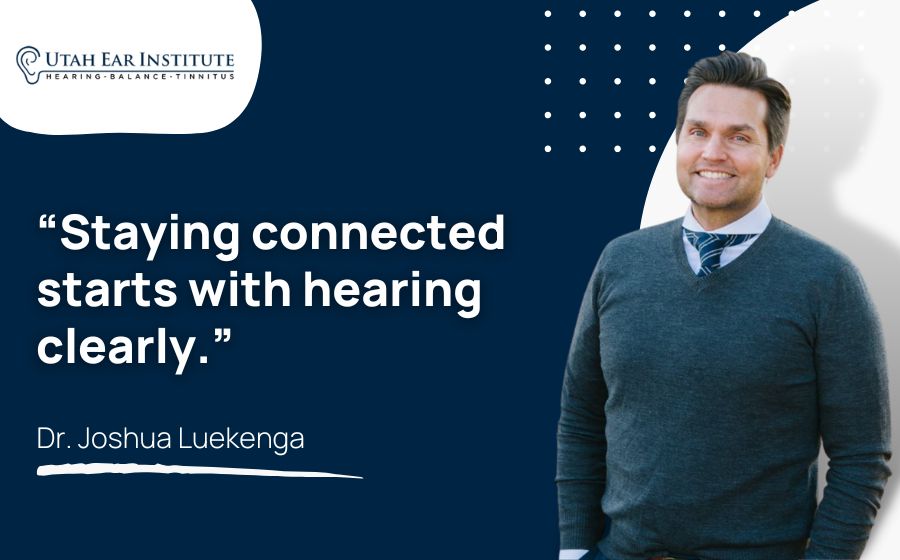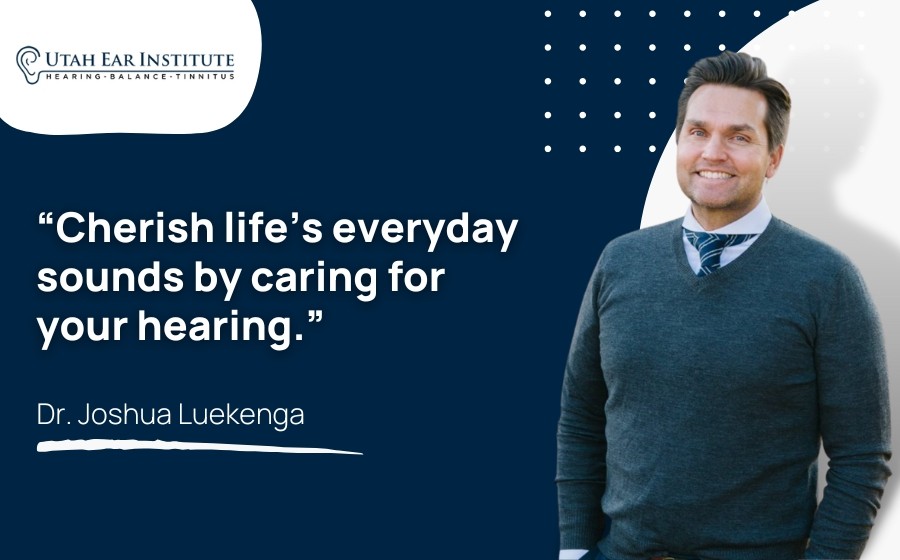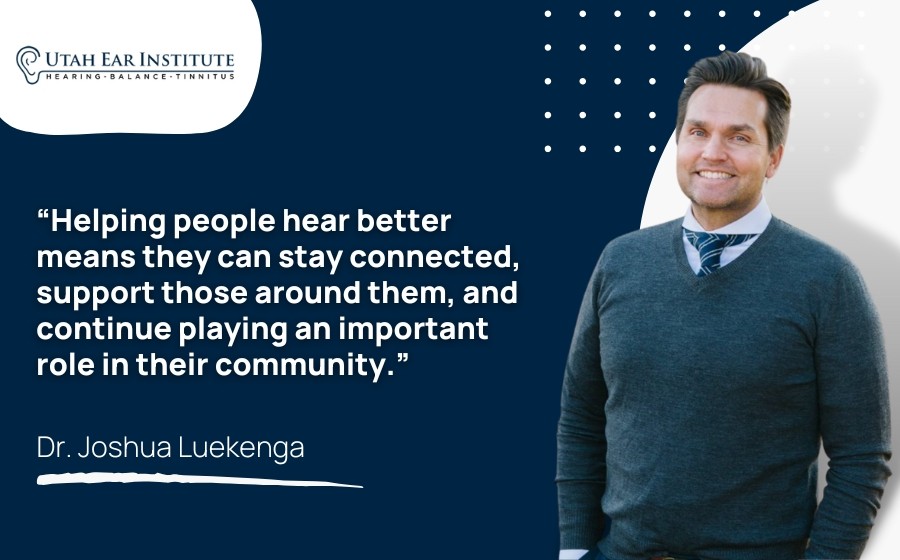Over-The-Counter vs. Prescription Hearing Aids – What’s the Difference?
Over-The-Counter vs. Prescription Hearing Aids – What’s the Difference?
Over-The-Counter vs. Prescription Hearing Aids – What’s the Difference?

Over-The-Counter vs. Prescription Hearing Aids – What’s the Difference?
06-15-18
There has been some confusion in recent years about what a hearing aid actually is and how to get one.
That’s because until now, there was insufficient regulation governing the industry.
But in August 2022, the U.S. Food and Drug Administration (FDA) issued a final ruling to improve access to hearing aids. This formalizes the 2017 bipartisan legislation requiring the FDA to create a category of over-the-counter (OTC) hearing aids.
Now that the final ruling is in place, consumers with mild to moderate hearing losses can purchase hearing aids directly from stores or online retailers without a medical exam, prescription, or fitting adjustment by an audiologist.
This should stimulate competition, but even safe and effective OTC hearing aids have their limitations. They differ from prescription hearing aids in the same way a general-purpose magnifying glass differs from prescription glasses in helping you see better.
For example, there are many products called hearing aids that are actually just glorified sound amplifiers.
So, what type of device might you need? How do you avoid choosing a device that might cost a lot without actually helping you?
In some cases, not getting the right device might do more harm than good.
Let’s start with a general overview of an OTC hearing aid.
Over-The-Counter (OTC) Hearing Aids Defined
OTC devices are made for the masses, not individuals. They are truly “one size fits all.” It’s just like buying reading glasses – they might help in certain situations, but they’re not the best solutions available and they might not help you at all.
That’s because OTC hearing aids are suitable only if you have a mild hearing loss and are over the age of 18.
Even then, they’re still not personalized to your specific needs. They have few adjustment options and won’t be physically fitted to your ears. At best, you’ll get a volume control or pre-programmed settings to try.
What’s more, you might need a whole new OTC hearing aid if your hearing loss gets worse. And there’s no support offered to advise you, either.
So, OTC hearing aids have only limited applications and are completely different from the benefits of prescription hearing aids.
Prescription Hearing Aids Defined
Prescription hearing aids are just like prescription lenses on a pair of glasses (or contact lenses) in that they’re specific and unique to each patient.
This level of personalization is no accident, of course.
You need a comprehensive hearing assessment to be fitted for a prescription hearing aid. This assessment is performed by a professional audiologist who can accurately diagnose your hearing issue. (This is exactly the same concept as visiting an eye doctor to determine your unique vision correction needs prior to ordering lenses.)
Prescription hearing aids are selected based on the degree of your hearing loss, specific technology needs (what devices do you typically connect with?), lifestyle (how many environments do you typically encounter in your daily life, each requiring its own programming?) and other key features such as dexterity and visibility issues that may be specific to you.
Prescription hearing aids can be programmed to meet your current hearing needs and quite often your future needs as well. You can also be helped if there are complications, such as one ear hearing better than the other.
Your personalized hearing loss is then programmed into an algorithm which correctly process the sounds around you and enhances your hearing regardless of your environment.
It doesn’t stop there. After programming the devices, verification measurements used by your audiologist will ensure the prescription is actually working as intended and will make adjustments as needed.
How to Take the Next Step
We offer four locations across Utah, which means we aren’t too far away.
Our passion for helping people hear their very best and reach their full hearing potential will ensure you enjoy a comfortable healthcare experience. It all starts with a consultation that provides a painless and non-invasive hearing assessment. That’s all it takes to start a tailor-fit treatment plan that ensures real hope and improvement for you.
We’re super friendly, so schedule an appointment -- walk-ins are welcome too.
Go ahead – call us anytime with your questions, concerns, and comments. We’d love to help you!
Request a Callback
Search

Over-The-Counter vs. Prescription Hearing Aids – What’s the Difference?
06-15-18
There has been some confusion in recent years about what a hearing aid actually is and how to get one.
That’s because until now, there was insufficient regulation governing the industry.
But in August 2022, the U.S. Food and Drug Administration (FDA) issued a final ruling to improve access to hearing aids. This formalizes the 2017 bipartisan legislation requiring the FDA to create a category of over-the-counter (OTC) hearing aids.
Now that the final ruling is in place, consumers with mild to moderate hearing losses can purchase hearing aids directly from stores or online retailers without a medical exam, prescription, or fitting adjustment by an audiologist.
This should stimulate competition, but even safe and effective OTC hearing aids have their limitations. They differ from prescription hearing aids in the same way a general-purpose magnifying glass differs from prescription glasses in helping you see better.
For example, there are many products called hearing aids that are actually just glorified sound amplifiers.
So, what type of device might you need? How do you avoid choosing a device that might cost a lot without actually helping you?
In some cases, not getting the right device might do more harm than good.
Let’s start with a general overview of an OTC hearing aid.
Over-The-Counter (OTC) Hearing Aids Defined
OTC devices are made for the masses, not individuals. They are truly “one size fits all.” It’s just like buying reading glasses – they might help in certain situations, but they’re not the best solutions available and they might not help you at all.
That’s because OTC hearing aids are suitable only if you have a mild hearing loss and are over the age of 18.
Even then, they’re still not personalized to your specific needs. They have few adjustment options and won’t be physically fitted to your ears. At best, you’ll get a volume control or pre-programmed settings to try.
What’s more, you might need a whole new OTC hearing aid if your hearing loss gets worse. And there’s no support offered to advise you, either.
So, OTC hearing aids have only limited applications and are completely different from the benefits of prescription hearing aids.
Prescription Hearing Aids Defined
Prescription hearing aids are just like prescription lenses on a pair of glasses (or contact lenses) in that they’re specific and unique to each patient.
This level of personalization is no accident, of course.
You need a comprehensive hearing assessment to be fitted for a prescription hearing aid. This assessment is performed by a professional audiologist who can accurately diagnose your hearing issue. (This is exactly the same concept as visiting an eye doctor to determine your unique vision correction needs prior to ordering lenses.)
Prescription hearing aids are selected based on the degree of your hearing loss, specific technology needs (what devices do you typically connect with?), lifestyle (how many environments do you typically encounter in your daily life, each requiring its own programming?) and other key features such as dexterity and visibility issues that may be specific to you.
Prescription hearing aids can be programmed to meet your current hearing needs and quite often your future needs as well. You can also be helped if there are complications, such as one ear hearing better than the other.
Your personalized hearing loss is then programmed into an algorithm which correctly process the sounds around you and enhances your hearing regardless of your environment.
It doesn’t stop there. After programming the devices, verification measurements used by your audiologist will ensure the prescription is actually working as intended and will make adjustments as needed.
How to Take the Next Step
We offer four locations across Utah, which means we aren’t too far away.
Our passion for helping people hear their very best and reach their full hearing potential will ensure you enjoy a comfortable healthcare experience. It all starts with a consultation that provides a painless and non-invasive hearing assessment. That’s all it takes to start a tailor-fit treatment plan that ensures real hope and improvement for you.
We’re super friendly, so schedule an appointment -- walk-ins are welcome too.
Go ahead – call us anytime with your questions, concerns, and comments. We’d love to help you!
Request a Callback
Search

Over-The-Counter vs. Prescription Hearing Aids – What’s the Difference?
06-15-18
There has been some confusion in recent years about what a hearing aid actually is and how to get one.
That’s because until now, there was insufficient regulation governing the industry.
But in August 2022, the U.S. Food and Drug Administration (FDA) issued a final ruling to improve access to hearing aids. This formalizes the 2017 bipartisan legislation requiring the FDA to create a category of over-the-counter (OTC) hearing aids.
Now that the final ruling is in place, consumers with mild to moderate hearing losses can purchase hearing aids directly from stores or online retailers without a medical exam, prescription, or fitting adjustment by an audiologist.
This should stimulate competition, but even safe and effective OTC hearing aids have their limitations. They differ from prescription hearing aids in the same way a general-purpose magnifying glass differs from prescription glasses in helping you see better.
For example, there are many products called hearing aids that are actually just glorified sound amplifiers.
So, what type of device might you need? How do you avoid choosing a device that might cost a lot without actually helping you?
In some cases, not getting the right device might do more harm than good.
Let’s start with a general overview of an OTC hearing aid.
Over-The-Counter (OTC) Hearing Aids Defined
OTC devices are made for the masses, not individuals. They are truly “one size fits all.” It’s just like buying reading glasses – they might help in certain situations, but they’re not the best solutions available and they might not help you at all.
That’s because OTC hearing aids are suitable only if you have a mild hearing loss and are over the age of 18.
Even then, they’re still not personalized to your specific needs. They have few adjustment options and won’t be physically fitted to your ears. At best, you’ll get a volume control or pre-programmed settings to try.
What’s more, you might need a whole new OTC hearing aid if your hearing loss gets worse. And there’s no support offered to advise you, either.
So, OTC hearing aids have only limited applications and are completely different from the benefits of prescription hearing aids.
Prescription Hearing Aids Defined
Prescription hearing aids are just like prescription lenses on a pair of glasses (or contact lenses) in that they’re specific and unique to each patient.
This level of personalization is no accident, of course.
You need a comprehensive hearing assessment to be fitted for a prescription hearing aid. This assessment is performed by a professional audiologist who can accurately diagnose your hearing issue. (This is exactly the same concept as visiting an eye doctor to determine your unique vision correction needs prior to ordering lenses.)
Prescription hearing aids are selected based on the degree of your hearing loss, specific technology needs (what devices do you typically connect with?), lifestyle (how many environments do you typically encounter in your daily life, each requiring its own programming?) and other key features such as dexterity and visibility issues that may be specific to you.
Prescription hearing aids can be programmed to meet your current hearing needs and quite often your future needs as well. You can also be helped if there are complications, such as one ear hearing better than the other.
Your personalized hearing loss is then programmed into an algorithm which correctly process the sounds around you and enhances your hearing regardless of your environment.
It doesn’t stop there. After programming the devices, verification measurements used by your audiologist will ensure the prescription is actually working as intended and will make adjustments as needed.
How to Take the Next Step
We offer four locations across Utah, which means we aren’t too far away.
Our passion for helping people hear their very best and reach their full hearing potential will ensure you enjoy a comfortable healthcare experience. It all starts with a consultation that provides a painless and non-invasive hearing assessment. That’s all it takes to start a tailor-fit treatment plan that ensures real hope and improvement for you.
We’re super friendly, so schedule an appointment -- walk-ins are welcome too.
Go ahead – call us anytime with your questions, concerns, and comments. We’d love to help you!
Request a Callback
Search
Ask Dr. Josh
Our latest hearing health articles, resources & blogs

How Hearing Aids Helped Improve Communication and Brain Health: Glen’s Story
Early hearing support can protect your brain and improve daily conversations.

How Modern Hearing Aids Helped Protect the Sounds Judith Loves
Protect your hearing and enjoy the sounds you love every day.

Hear for the Holidays 2025 – Meet This Year’s Winner!
Meet Todd, our 2025 Hear for the Holidays winner.
Ask Dr. Josh
Our latest hearing health articles, resources & blogs

How Hearing Aids Helped Improve Communication and Brain Health: Glen’s Story
Early hearing support can protect your brain and improve daily conversations.

How Modern Hearing Aids Helped Protect the Sounds Judith Loves
Protect your hearing and enjoy the sounds you love every day.

Hear for the Holidays 2025 – Meet This Year’s Winner!
Meet Todd, our 2025 Hear for the Holidays winner.
Ask Dr. Josh
Our latest hearing health articles, resources & blogs

How Hearing Aids Helped Improve Communication and Brain Health: Glen’s Story
Early hearing support can protect your brain and improve daily conversations.

How Modern Hearing Aids Helped Protect the Sounds Judith Loves
Protect your hearing and enjoy the sounds you love every day.

Hear for the Holidays 2025 – Meet This Year’s Winner!
Meet Todd, our 2025 Hear for the Holidays winner.